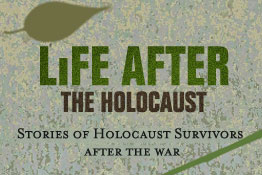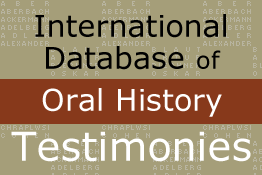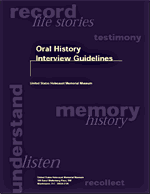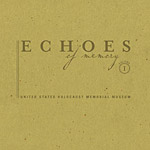
|
ORAL
HISTORY
|
To search the collection: The public may search the collection of testimonies via the Library and Archives online catalog.

"Life After the Holocaust" is an oral history project documenting the life experiences of six Holocaust survivors from the end of World War II to the present time.
Explore the survivors’ experiences
|

NEW ONLINE: International Database of Oral History Testimonies
This catalog provides a tool for all those interested in the location of Holocaust oral history collections worldwide. Over 125 entities are listed in the catalog, ranging from major institutions to local community organizations.
Search the catalog
|
|
get RealPlayer
|
![Describes deportations from the Lodz ghetto [1994 interview]](images/brstill.jpg)
Blanka Rothschild
Describes deportations from the Lodz ghetto [1994 interview]
Born 1922, Lodz, Poland
Blanka was an only child in a close-knit family in Lodz, Poland. Her father died in 1937. After the German invasion of Poland, Blanka and her mother remained in Lodz with Blanka's grandmother, who was unable to travel. Along with other relatives, they were forced into the Lodz ghetto in 1940. There, Blanka worked in a bakery. She and her mother later worked in a hospital in the Lodz ghetto, where they remained until late 1944 when they were deported to the Ravensbrueck camp in Germany. From Ravensbrueck, Blanka and her mother were sent to a subcamp of Sachsenhausen. Blanka was forced to work in the Arado-Werke airplane factory. Her mother was sent to another camp. Soviet forces liberated Blanka in spring 1945. Blanka, living in abandoned houses, made her way back to Lodz. She discovered that none of her relatives, including her mother, had survived. Blanka then moved westward to Berlin, eventually to a displaced persons camp. She emigrated to the United States in 1947.
|
|
|
Overview
The U.S. Holocaust Memorial Museum’s oral history collection is one of the largest and most diverse resources for Holocaust testimonies in the world. The collection contains over 9,000 audio and video interviews. These testimonies enable students, researchers, and the general public to see and hear the first-hand accounts of those who experienced, witnessed, or perpetrated the events of the Holocaust.
Edited segments of many of these testimonies are incorporated into the Museum’s Permanent Exhibition, The Holocaust, temporary exhibitions, online exhibitions, the Wexner Learning Center, and the online Holocaust Learning Center.
While many of the testimonies have been collected from other institutions and individuals, over 1,600 interviews have been conducted by the Museum’s own Oral History Branch. These include interviews with survivors of the Holocaust and Nazi persecution, including Jews, Roma (Gypsies), Polish Gentiles, Jehovah’s Witnesses, homosexuals, and political prisoners; they also include interviews with resistance fighters, rescuers, witnesses, collaborators, perpetrators, liberators, postwar prosecutors, and relief workers.
The Oral History Branch has conducted interview projects in Belarus, the Czech Republic, Estonia, France, Germany, Greece, Israel, Latvia, Lithuania, Macedonia, Moldova, the Netherlands, Poland, Romania, Ukraine, and the former Yugoslavia, as well as in the United States.
The Oral History Branch is still conducting a limited number of interviews in the United States and Europe.

Access to Oral History Interviews
Access to the Museum’s oral history collection is available through the Archives Branch.
To search the collection: The public may search the collection of testimonies via the Library and Archives online catalog.
To view and/or listen to Holocaust testimonies: Copies of taped oral history testimonies may be viewed and/or listened to in the Library and Archives reading room by contacting the Archives Reference desk, at (202) 488-6113 or archives@ushmm.org. The Archives Reference staff is available to retrieve oral history interview tapes Monday through Friday, 10 a.m.–5 p.m. (closed on Federal holidays, Yom Kippur, and Christmas Day). The last pull for archival requests is at 4 p.m. To avoid waiting, researchers are advised to contact the Archives Reference desk in advance of their visit. Arrangements can be made in advance for oral history tapes to be set aside for weekend viewing in the Library and Archives reading room.
To obtain tapes and transcripts: Researchers may purchase a copy of interview tapes and, if available, transcripts, depending on restrictions. (See “Permission,” below.) For each video cassette tape, the cost of duplication is $32.00. For each audio cassette tape, the cost of duplication is $16.50. The cost of photocopying a transcript is $.30 per page. There is a minimum order charge of $5.00. You may also request that the transcript be sent as an e-mail attachment, at no charge. To request tapes and/or transcripts, contact the Archives Reference desk at (202) 488-6113; or at archives@ushmm.org.
Permission for Use of Oral History Interviews
Most oral history interviews are copyrighted. Additionally, an interviewee may have placed restrictions on the use of his/her interview. Researchers should contact the Archives Reference desk, at (202) 488-6113 or archives@ushmm.org to inquire about restrictions and to obtain permission for use.
Publications
To aid the public in conducting oral history projects of their own, the Oral History Branch has produced a unique reference tool entitled, Oral History Interview Guidelines.
 |
The Oral History Branch’s 140-page book of interview guidelines provides guidance on many aspects of conducting an interview. Included are step-by-step suggestions for making initial contact with a potential interviewee, conducting research and preparing questions for the interview, and producing finding aids such as transcripts and summaries after the interview. These guidelines are provided free of charge.
View interview guidelines as .pdf
Get Adobe acrobat
e-mail oralhistory@ushmm.org
or call (202) 488-6103
|
 |
Memory Project
Use the USHMM’s Memory Project as a model to provide survivors with another outlet through which to share their memories. Writing workshops such as those described here can help guide survivors in the production of a document for their family members, as well as for historical archives.
Learn more
|
Document Holocaust Experiences
The Museum’s Oral History Branch is seeking information about the experiences of Holocaust survivors and witnesses. A questionnaire will be sent to individuals who wish to document their experiences. With permission, the information provided in the questionnaire will be made available to researchers. Please contact Oral History at (202) 488-6103, or at oralhistory@ushmm.org to receive our Oral History Questionnaire.
|
|
Contact us at:
Oral History
United States Holocaust Memorial Museum
100 Raoul Wallenberg Place, SW
Washington, DC 20024-2126
Tel.: (202) 488-6103
E-mail: oralhistory@ushmm.org
|
|
